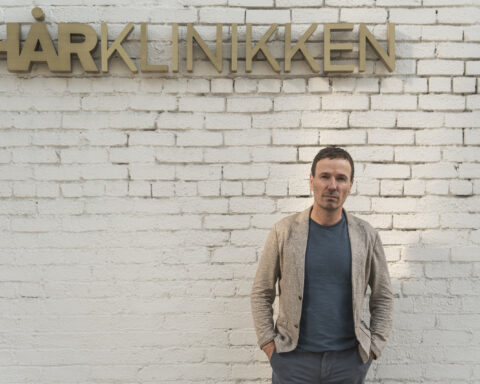After seeing the powerful benefits of laugh and play through her work with cancer patients, Yasmin Butt launched the Laughter Movement in 2017. She had watched firsthand as those with severe illnesses were able to lift their mood without medication with this natural, positive intervention, and wanted to apply the same technique to help folks everywhere overcome everyday lows. The benefits of laughter include releasing endorphins — a natural feelgood chemical — which gives us a a natural high similar to the effect of mood-enhancing drugs. It can also relax the body, boost the immune system, and make our physical and emotional reaction to stress less intense. So far, Jasmin, who is based in San Francisco, California, has worked with 179 organizations including the US Army, Facebook, Google, Uber, Spotify and British Petroleum to help put a smile on the faces of their employees. And now she is on a mission to shake-up the mental health industry to make therapy as easy to access as takeaway food.
Tell us your story, and how you ended up in this line of work?
I graduated to be a psychologist about 10 years ago, and I had quite a typical journey. Like many other psychologists, I worked in a mental health hospital, and then an addiction center, and then began my own practice. And then six years later, when I was doing my second masters degree, my major was neuroscience of the dying, and I was trying to find out how we can avoid medicines that are abused by patients, because most of the time patients have to go on antidepressants and pain medication, and they can end up abusing and overusing it. People get addicted to these medications, and it comes to a point where they cannot deal with depression, anxiety, or stress without it.
So that took me back to my early years of practice in an addiction center, where I used to run simple exercises like laughter therapy and art therapy, and it would help patients recover from serious addictions. I worked with cancer patients as well, inside a cancer ward in Pakistan, where my sole job every single day was to inform patients they were going to lose their leg or their hair, or how long they had to live. One thing I found very interesting is that whenever I went to the children’s ward, where there were kids going through terminal diseases, they would be happy, because they would be enjoying their art therapy or their play therapy. So what I learned through this process is people with a serious illness can still have very good mental health. And equally, people without an illness can have bad mental health. But the problem in our society is we wait until we have a mental illness before we go to see a psychologist, so day-to-day mental health is not properly catered for.
So my experience with these cancer patients, in particular as a play therapist working with these kids, and my work in the addiction center came together, and I started working on laughter therapy. I was thinking more and more about everyday mental health, and what can we do to improve our mood. We tested on a sample of people who were suffering from 80% depression, and after 12 weeks of laughter therapy they went down to 30% depressed. So seeing that it works was a huge incentive for me. So I took this huge leap of faith, and hosted the first workshop at my house. I posted it on Facebook, $50 for 40 minutes of laughter therapy, and 20 people showed up. So that was nice, I made some money out of making people laugh. So then we started doing more and more workshops, and one thing I noticed was that while I expected people with terminal diseases or depression to be showing up, the kind of people who were coming were mostly techies, CFO and CEOs, and not suffering with an illness. And the more I thought about it, the more I realized that people suffering from some kind of illness or disease usually have access to therapy, doctors and a support system. A person who goes to work everyday, functions and looks fine, does not receive that kind of support, but they also need some kind of day-to-day help with their mental health.

A Laughter Movement session
So why did you decide to focus on laughter therapy in particular?
One thing which is very interesting about laughter therapy is you don’t have to learn to do it. Laughing is easy. When I start laughing, you start laughing with me. So there are no skills needed. When you go to therapy, you generally have to learn different tools, like meditating or yoga, or whatever you decide to do to improve your mental health. You have to form a new habit. But if you’re going through depression, or you’re just in a low mood, it’s unlikely that you will have the strength to learn something new. And a question I’ve asked myself, and my professors, a lot is, ‘Why are mental health solutions so hard?’ Not only for the patients, but also as therapists. I’m 33 now, and I still feel that I could have more tools and more information to help me practice better. But they make it hard for the therapist and for the patient, which is why a lot of people don’t end up going into therapy. So I feel like therapeutic solutions needed to be easier to get people on board, and then once they’re comfortable, you can start offering them more detailed solutions.
We started using laughter therapy as a team building exercise, and very quickly our user based included the US Army, Facebook, Google, Airbnb, Spotify and Disney. I remember the first time that I did it with the US Army, working with very young veterans, and we would test them pre and post session. Pre session their happiness would be somewhere around like 5.94 on a scale from one to 10, and then after the 40 minute session it would be 8.93 on average. So that was a huge jump that you don’t experience that quickly from something like yoga. Laughter basically tricks your mind into thinking that you’re happy and it’s a really healthy way to get there, instead of ice cream or Netflix or shopping. There’s nothing to lose from this.
So what’s next for the Laughter Movement?
When the pandemic happened we immediately went online, and that ended up being incredibly popular. So now we’re doing sessions on and offline. We’ve started exploring VR, and are also developing a platform that allows people to call 24/7 and just laugh, like a laughter helpline. It’s like an Uber model where we pay people on the other side to be laughter therapists, and they can get paid to make people laugh.
What a great idea! And more broadly, it’s a worthy mission to make therapy more accessible…
The focus of all my work in the future will be making mental health solutions easier. As a psychologist I feel like our community is not interested in creating easier solutions, and it is not producing solutions for day-to-day mental health. We’re so snobby and keeping these things difficult for a reason. While other businesses, like food delivery apps, streaming services or Uber, have seen a problem or gap in their industry and solved it to make it easier. But if you want to see a therapist, it can be so complicated and expensive. So we want to make it easier for all people to engage with therapy.
Find out more about the Laughter Movement here.











